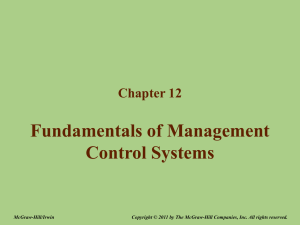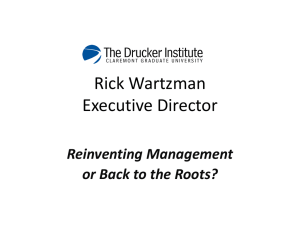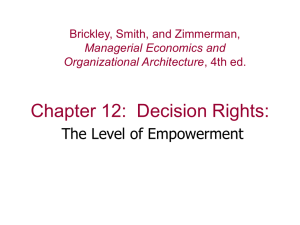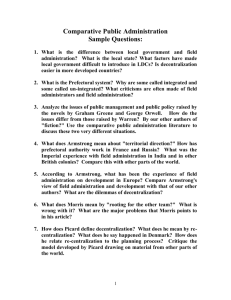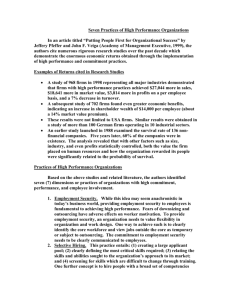Chapter 11
advertisement
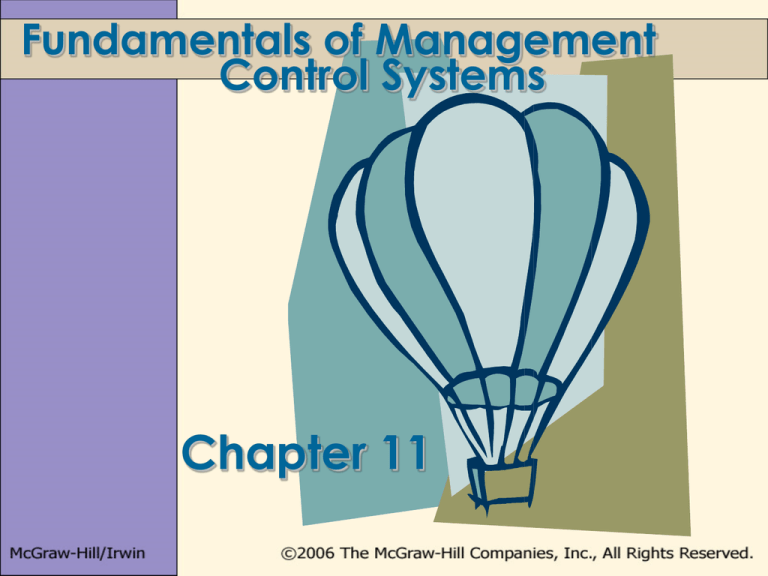
Fundamentals of Management Control Systems Chapter 11 Learning Objectives 1. Explain the role of a management control system. 2. Identify the advantages and disadvantages of decentralization. 3. Describe and explain the basic framework for management control systems. 4. Explain the relation between organization structure and responsibility centers. 5. Understand how managers evaluate performance. 6. Analyze the effect of dual versus single rate allocation systems. 7. Understand the potential link between incentives and illegal or unethical behavior. 11-2 Management Control System L.O. 1 Explain the role of a management control system. A management control system is designed to influence subordinates to act in the organization’s interest. 11-3 Decentralization L.O. 2 Identify the advantages and disadvantages of decentralization. The delegation to subordinates the authority to make decisions in the organization’s name. 11-4 Decentralization Continued Centralized Organization Decisions are made by relatively few individuals in the high ranks of the organizations. Few decisions are delegated Decentralized Organization Decisions are spread among relatively many managers. Decisions are delegated to divisional managers 11-5 11-6 Advantages of Decentralization Local managers have information about local conditions and can react quicker than top management. Local managers have opportunity for on-the-job training in decision making and have the satisfaction of making their own decisions. Top managers have knowledge about strategic issues and have more time for strategic decision making. 11-7 Disadvantage of Decentralization Dysfunctional decision making When local managers make decisions in their best interest that may not be in the best interest of the organization. Duplication of administration Local managers make the same types of decisions made at headquarters. Management Control Systems 11-8 L.O. 3 Describe and explain the basic framework for management control systems. A system designed to influence subordinates to act in the organization’s interest Used by principals (owners) to influence agents’ (managers’) behavior Delegated decision authority Performance evaluation and measurement Compensation and reward decision Delegated Decision Authority A management control system specifies what decisions the subordinate manager can make in the name of the organization. 11-9 11-10 Performance Evaluation and Measurement A management control system specifies how the subordinate manager’s performance is measure and evaluated. Compensation or Reward A management control system defines how the subordinate manager is compensated. 11-11 Balancing the Elements The goal of the organization is to make money. The goal of the subordinate manager is to make money. An effective management control system influences the subordinate manager through compensations and rewards to make decisions that make money for the organization. 11-12 Responsibility Accounting 11-13 L.O. 4 Explain the relation between organization structure and responsibility centers. Costs and revenues are reported at the level within the organization having the related responsibility. Cost center Profit center Revenue center Responsibility center Investment center 11-14 Cost Center Cost center Manager is responsible for costs Cost and volume of inputs used to produce an output Revenue Center Revenue center 11-15 Manager is responsible for revenues Selling a product 11-16 Profit Center Profit center Manager is responsible for revenues AND costs Revenues, costs, production, sales volume Investment Center Investment Manager is responsible for profits AND investment in assets center Profits, capital budgeting, use of assets 11-17 11-18 Responsibility Centers and Organization Structure Organizational Structure and Responsibility Centers Group Vice-President a Investment centers Division Vice-President Profit centers Plant managers Cost centers Staff managers Discretionary cost centers District sales managers Revenue centers a Group refers to a group of divisions. Goal Congruence Agreement by all members of a group on a set of objectives 11-19 Evaluating Performance L.O. 5 Understand how managers evaluate performance. Controllability concept Managers should be held responsible for costs or profits over which they have decision-making authority Relative performance evaluation (RPE) Compares divisional performance with that of peer group divisions 11-20 Compensation Systems Fixed compensation Not performance based Contingent compensation Performance based 11-21 Corporate Cost Allocation 11-22 L.O. 6 Analyze the effect of dual versus single rate allocation systems. Global Electronics Latin America Division Income for the Year (in thousands) Revenue (Percentage of corporate revenue) Direct division costs Allocated corporate overhead Operating profit Global Electronics allocates corporate overhead based on relative revenue. Actual $ 70,000 16% $ 51,800 $ 4,800 Target $ 70,000 14% $ 51,800 $ 3,500 $ 47,000 $ 48,300 11-23 Corporate Cost Allocation Continued Global Electronics Latin America Division Income for the Year (in thousands) Actual Revenue Direct division costs $ 70,000 $ 51,800 My revenue and costs were on target. Target $ 70,000 $ 51,800 11-24 Corporate Cost Allocation Continued Global Electronics Latin America Division Income for the Year (in thousands) Revenue (Percentage of corporate revenue) Corporate revenue a b $70,000/16% $70,000/14% Actual $ 70,000 16% $ 437,500 Target $ 70,000 14% a I’m not responsible for corporate revenue. $ 500,000 b 11-25 Corporate Cost Allocation Continued Global Electronics Latin America Division Income for the Year (in thousands) Allocated corporate overhead (Percentage of corporate revenue) Corporate costs a b $4,800/16% $3,500/14% Actual $ 4,800 16% $ 30,000 Target $ 3,500 14% a I’m not responsible for corporate costs. $ 25,000 b 11-26 Activity Cost Dual rate method Separates a common cost into fixed and variable components and then allocates each component using a different allocation base Cost Corporate Cost Allocation Continued Activity 11-27 Performance Evaluation Systems Incentives L.O. 7 Understand the potential link between incentives and illegal or unethical behavior. Does the measure reflect the results of the actions that improve the organization’s performance? What actions can improve reported performance but which are detrimental to organizational performance? Unrealistic Budget Pressure HELP!! This is impossible Unrealistic budget pressures, particularly for short-term results, occur when headquarters arbitrarily determines profit objectives and budgets without considering actual conditions. 11-28 Financial Pressure Financial pressure resulting from bonus plans that depend on shortterm economic performance is particularly acute when the bonus is a significant component of the individual’s total compensation. 11-29 11-30 Chapter 11 Sometimes I just don’t get it. What do they want?
